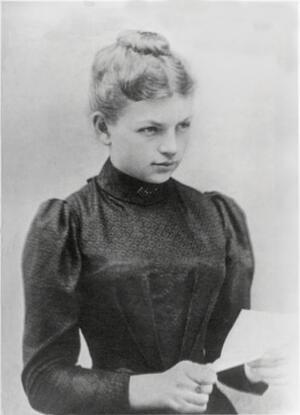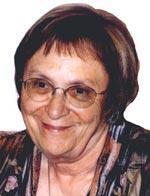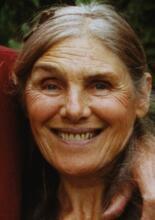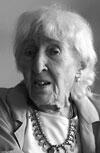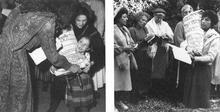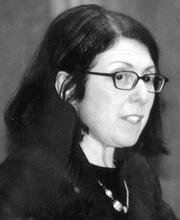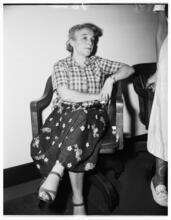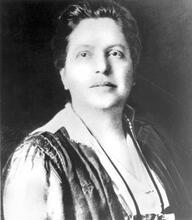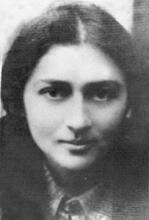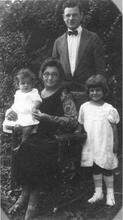Clara Immerwahr
Clara Immerwahr’s name has become linked with moral responsibility in science. In 1898 she was the first woman in Germany to pass the predoctoral qualifying examination for professional chemists and in 1900 she became the first woman awarded a doctorate in physical chemistry at a German university. Always in her husband Fritz Haber’s shadow, her work was overlooked in male-dominated university circles. During World War I Haber became the father of modern gas warfare, and Immerwahr came out in open opposition to his work, labeling it a “perversion of the ideals of science.” After the first gas attack in April 1915, Immerwahr committed suicide at a party thrown in her husband’s honor. Immerwahr came to the attention of the German public only in the 1970s, when scholarly articles and a biography publicized her struggles.
A role model for civic courage, Clara Immerwahr has since the 1970s been inextricably connected with the history of weapons of mass destruction and the social and moral responsibility of scientists.
Early Life & Education
Clara Immerwahr was born on June 21, 1870, on the Polkendorff Farm near Breslau, where she grew up together with her three older siblings, Elli, Rose, and Paul, in a wealthy, highly cultured, open and liberal family, which wore its Jewishness lightly. Her father, Philipp Immerwahr, had studied chemistry and sought to establish a factory, but when this enterprise failed he turned to Polkendoff, where his farming skills and inventive spirit combined to make him wealthy. He married his cousin Anne, née Korn. The family regularly spent the winter months in Breslau, where Philipp’s mother owned a large store selling clothes and dress materials.
Together with her sisters, Clara received her early education from a private teacher, but beginning with the winter term of 1877 all three attended a girls’ school established in the house in which their grandmother lived, continuing to receive private tuition on the farm during the summer months. Quick-witted and thirsting for knowledge, Clara was an eager student, particularly interested in natural sciences and easily angered whenever her teachers referred to her “prospective sphere of women’s occupations.” By the time his sisters left school, Paul had already matriculated and was attending university in Berlin, where he ultimately earned his Ph.D. While her sisters wanted only to marry, Clara envied her brother and in her late teens determined to take up a scientific career.
Education in Chemistry
When her mother died of cancer in 1890, the farm was handed over to Elli and her husband Siegfried, while Clara and her father moved to Breslau. Here she met Fritz Haber (1868–1934) at a dancing lesson and fell in love with him, but she declined his offer of marriage because she wanted to be economically independent. She therefore began studies at a teacher’s seminary, where the principal, Miss Knittel, a well-educated and widely traveled woman, soon recognized her aptitude and presented her with Jane Marcet’s Conversations on Chemistry. Delighted in Clara’s interest in his own area of specialization, her father helped her with her studies and later also provided financial support for her research.
After completing her studies at the seminary Clara worked as a governess, giving private lessons, but at the same time she fought for permission to take the preliminary examination that would enable her to qualify for university entrance. In 1895–1896 women teachers were finally permitted to attend lectures at Breslau University as visitors. In 1898, Clara Immerwahr became the first woman in Germany to pass the difficult Verbandsexamen, a predoctoral qualifying examination designed to raise standards in the training of professional chemists. On December 12, 1900, she was awarded a doctorate in physical chemistry magna cum laude, her dissertation being a study of the solubility of metal salts, conducted under the supervision of Professor Richard Abegg and dedicated to her “dear father.” She thus became the first woman to be awarded a doctorate in chemistry at a German university. On this occasion, she took an oath “never in speech or writing to teach anything that is contrary to my beliefs. To pursue truth and to advance the dignity of science to the heights which it deserves.” A local newspaper reported on this.
After working as laboratory assistant to Professor Abegg—at the highest rank attainable by women—Clara Immerwahr worked briefly as a researcher in Clausthal and gave lectures on “Physics and Chemistry in the Household” at various women’s organizations and institutes. She was several times invited to serve as discussant at the oral presentations of doctoral theses. Nevertheless, she began to feel an outsider in the male-dominated university circles.
Marriage to Fritz Haber
In April 1901 she and Fritz Haber met again. The latter had in the intervening years gained respect and recognition for his research in electrochemistry and thermodynamics and, later, especially made a name for himself as the inventor of large-scale catalytic synthesis of ammonia, which furnished the essential precursor for many important substances, both life-sustaining and destructive, particularly fertilizers and explosives used in mining and warfare. In 1898 he had been appointed professor at the Technological University in Karlsruhe. An ambitious and incorrigible workaholic, he had converted to Christianity in 1893. Clara herself was baptized in 1897, probably also for pragmatic reasons.
The couple married in August 1901 and settled in Karlsruhe. Although at first Clara thought she would be able to combine marriage and a career, and indeed continued her research, she soon found the demands of housekeeping for a husband whose ambitions led him to issue frequent dinner invitations to important guests overwhelming. To this was added a difficult pregnancy and the birth on June 1, 1902, of a sickly son, Hermann. Nevertheless, she collaborated with her husband in his research and especially his textbook on the thermodynamics of gas reaction, which he published in 1905 and which he dedicated to his “beloved wife, Mrs. Clara Haber, Ph.D., with thanks for quiet collaboration.” Clara Immerwahr continued to give lectures to women and was infuriated to find that people naturally assumed these had been written by her husband.
Haber’s Career & Development of Ammonia Synthesis
Fritz Haber’s career, on the other hand, flourished. In 1911 he was appointed head of the recently founded Kaiser Wilhelm Institute of physical chemistry and electrochemistry in Berlin. Along with the directorship he received a professorial chair at the University of Berlin and membership in the prestigious Prussian Academy of Sciences. Despite the antisemitism prevalent at the time, highly talented individuals of Jewish birth could still rise to the top of their professions, though in private their colleagues and fellow citizens regarded them as not fully German. Certain forms of discrimination remained in place, including a ban on Jews receiving commissions in the Prussian-dominated German army. The outbreak of World War I in 1914 gave Haber an opportunity to prove his patriotism.
Concentrating all his efforts on developing poison and other gases, he volunteered to work for the Supreme War Staff. He was soon entrusted with the development of war raw materials and with responsibility for the development of ammonia synthesis. In early 1915, he suggested a diabolically simple idea: to release highly toxic chlorine gas so that it would drift across to the enemy trenches, where it would kill, maim and disable without an artillery bombardment.
Implementation of Gas Warfare and Immerwahr’s Suicide
Appalled, Clara Immerwahr came out in open opposition to his work, condemning this “perversion of the ideals of science” as “a sign of barbarity, corrupting the very discipline which ought to bring new insights into life.” Her husband’s enthusiastic dedication to chemical warfare represented the final break. She several times pleaded with him to cease working on gas warfare. His angry response was to accuse her in public of making statements treasonous to the Fatherland.
Their marriage had in any case been in crisis. Haber was seldom at home and made his disdain for her scientific endeavors quite clear. He went on frequent trips with his colleagues and even had affairs with other women. In a letter to her friend Professor Abegg she had earlier complained that Fritz’s gain had been her loss.
The first poison gas attack took place on April 22, 1915, on the Western front in the Ypres sector of Belgium. Of the 7000 casualties that day, more than 5000 died. Countless additional attacks resulted in the deaths of at least 100,000 soldiers on both sides. Haber was promoted to the rank of captain. Returning in triumph from the front to their home in the elegant Berlin suburb of Dahlem, he attended a party in his honor on May 2, the night before he was due to go to the eastern front to supervise a gas attack. The couple quarreled. In the early hours of May 2 Clara Immerwahr took her husband’s pistol out to the garden and shot herself. Only their son Hermann heard the shot and alerted his father. On the same day Fritz traveled to the eastern front, leaving his son to deal with the situation. (Hermann himself committed suicide in 1945.) On May 8 the Grunewald Zeitung reported on the suicide of the wife of Dr. H. of the Secret Service, “who is currently at the front,” adding that “the reasons for the unhappy woman’s act are not known.” For the rest of his life Haber never discussed any of the events of her death.
Haber’s Legacy
In 1918 Haber was awarded the Nobel Prize for his pathbreaking work in ammonia synthesis, but when he received the award the great physicist Ernest Rutherford refused to shake his hand. A few months later there were calls for him to be tried as a war criminal. In May 1933, following the Nazi rise to power, Haber was called to dismiss all Jewish members of his staff but preferred to resign his position and go into exile, finding refuge in England at Cambridge University. Neither the climate nor the work environment was to his liking. He felt rejected as a pariah for his war activities. Emotionally shattered, he decided to go to Italy. En route in January 1934 he died of a heart attack in Basel. Many years later, in 1968, when the University of Karlsruhe honored the centenary of his birth, the commemorative ceremony was interrupted by students who unfurled a banner reading “Celebration for a Murderer/Haber=Father of Gas Warfare.”
Immerwahr’s Legacy
As for Clara Immerwahr, her legacy began to come to the attention of the German public in the 1970s. Historians and activists began to investigate the remarkable woman who ended her life in protest against the desecration of science. Articles and a full-length biography by Gerit von Leitner publicized her struggles. In 1991 the German Section of International Physicians for the Prevention of Nuclear War awarded its most prestigious award, the Clara Immerwahr Prize. Since November 2000 the University of Dortmund has a mentoring project for women students which is named for her. A model of civic courage, she is the subject of Tony Harrison’s 1992 play Square Rounds.
Throughout her tragically short life, Clara remained faithful to her name, Immerwahr—always true.
Selected Works by Clara Immerwahr
“Potentiale von CU-Elektroden in Lösungen analytisch wichtiger CU-Niederschläge.” In Zeitschrift für anorganische Chemie 24 (1900): 269–279.
“Zur Kenntnis der Löslichkeit von Schwermetallniederschlägen auf elektrochemischem Wege.” In Zeitschrift für Elektrochemie (1901): 477–488.
von Leitner, Gerit. Der Fall Clara Immerwahr. Ein Leben für eine humane Wissenschaft. München: C.H. Beck, 1993.
Die Hälfte des Lebens, femina doctissima Clara Immerwahr (television documentary).
Lexikon Jüdische Frauen. Edited by Jutta Dick and Marina Sassenberg. N.p.: Rowohlt, 1993.

